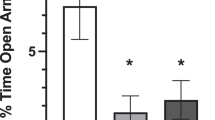Abstract
THE following investigation arose from considerations based upon well-known observations on the state of normal sleep. These are: (a) that during sleep the urine volume output is decreased and the blood diluted; (b) that many drugs (caffeine, etc.) which cause wakefulness are diuretics; and (c) that severe muscular work which, it is recognized, often facilitates the onset of sleep, has an antidiuretic action. It was thought, therefore, that the antidiuretic principle of the posterior pituitary, if given together with water, might possibly bring about an internal milieu so similar in many ways to that of normal sleep (for example, antidiuresis, dilution of the blood) that this state might eventually cause, deepen or prolong natural sleep.
This is a preview of subscription content, access via your institution
Access options
Subscribe to this journal
Receive 51 print issues and online access
$199.00 per year
only $3.90 per issue
Buy this article
- Purchase on Springer Link
- Instant access to full article PDF
Prices may be subject to local taxes which are calculated during checkout
Similar content being viewed by others
References
Kleitman, N., "Sleep and Wakefulness" (Chicago: Chicago University Press, 1939).
Thomson, W. O., Thomson, P. K., and Dailey, M. E., Proc. U.S. Nat. Acad. Sci., 14, 94 (1938).
Author information
Authors and Affiliations
Rights and permissions
About this article
Cite this article
SCHÜTZ, F. Induction of Sleep by Simultaneous Administration of Posterior Pituitary Extracts and Water. Nature 153, 432–433 (1944). https://doi.org/10.1038/153432b0
Issue Date:
DOI: https://doi.org/10.1038/153432b0
This article is cited by
-
Pharmacological Action of Cyanic Acid
Nature (1945)
Comments
By submitting a comment you agree to abide by our Terms and Community Guidelines. If you find something abusive or that does not comply with our terms or guidelines please flag it as inappropriate.



